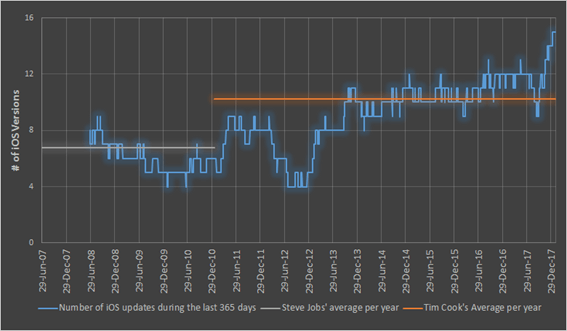Again error on iOS? The text “bomb” error was another nightmare for Apple device users: with a message containing a certain character from the Indian Telugu language your iPhone's messaging and WiFi features apps not only crash and keep crashing.
Apple released a patch on February 19, but the Telugu error is not the only software problem the company has had in recent months.
Critics of iOS 11 say various updates have slowed down their phones, reduced battery life and come with other bugs.
All of this raises questions about Apple's quality control, and a closer look at the data suggests that the problem probably exists.
Since the death of Steve Jobs in January 2011, the frequency of iOS updates has increased by 51%.
What does this mean for Apple users? Many updates, patches and sometimes follow-up updates.
For example, current iPhone owners had to update iOS 15 times during the year and until January 31, 2018. On the other hand, Apple only released six iOS updates during the 12 months before its departure. Jobs.
Increase the frequency of iOS updates
The following table, created from various sources and displays updates to the iPod Touch, iPad, iPhone 4 CDMA, iPhone 3GS, and iPhone 7 and 7 Plus. The table shows very clearly the increase in the frequency of iOS updates in the decade 2007-2017.
The chart shows that during Apple's Jobs period, the average update rate at 365 days was 6,75. After his death, the average rose to 10,22 per year, an increase of 51%. The chart also shows that after Jobs left in January 2011 and after his death in October 2011, there was still a period of rare updates from the second quarter of 2012 to early 2013.
After that, the number of updates per year stabilized at around 10 each year, until the last 365 days of the survey period, during which there were 15 updates.
Why are iOS updates becoming more frequent?
There are many possible explanations for the uptick in the updates. One potential factor is the increasing complexity.
Smartphones are gaining more functionality, more applications and more accessories which implies an increasing complexity in operating system maintenance.
So software updates became more complicated, with more characteristics required for more devices in more languages and markets. However, there is also a steady flow news concerning errors, inattention to detail, poor performance and safety issues.
For example, Apple released an update to iOS 11 in September 2017 to improve security and add features.
By November, Apple needed to release an update to correct a bug caused by the lowercase letter i and to make some automatic corrections to a chapter A.
Users reported that iOS 11 was also slowing down their phones (unless they had backed up their data and reset to factory settings). The battery was running out faster, and the operating system was giving wrong answers to math problems. Indeed, the last week of November 2017 saw at least five major iOS and macOS issues, including security vulnerabilities that, when fixed, brought new issues.
The latest Telugu text error prompted Apple to release a patch immediately after the international headlines.
Of course, an Apple spokesman said that we should see the highest frequency of updates in a broader context. He said that Apple is working specifically to keep up to date with speed and simplicity on a large scale (to keep all users informed at the same time) and that the company believes it is able to quickly update something that is very good for consumers.
Apple also offers automated updates, so users need not worry, according to a company spokesman. And he noted that 65 percent of iOS users are in the latest version, compared to less than 1 percent of Android users who have the latest version of Android.
Reduction of quality by Apple?
The level of detailed orientation and excellence in Jobs leadership style is well known. Jobs is considered a genius, and he led Apple in a unique way that is difficult to reproduce. So when we see such a significant increase in updates and patches after its departure, it makes sense to ask whether the quality level of Apple products is in long-term decline. But while the update numbers seem to support the above hypothesis, the other metrics say otherwise.
Despite extensive coverage from the tech pages for the recently Apple's mistakes, investors seem unconcerned. Despite Jobs' death, the value of Apple's stock increased by about 240%.
Consumers do not seem to care. In early February, Apple announced record revenue for the first quarter of fiscal year 2018, from the first sales of iPhone X.
As it seems to consumers and investors, the brilliance of the Apple brand name can offset any software concerns.
But if the company continue to present such problems, the glow may fade…
Published on VB





